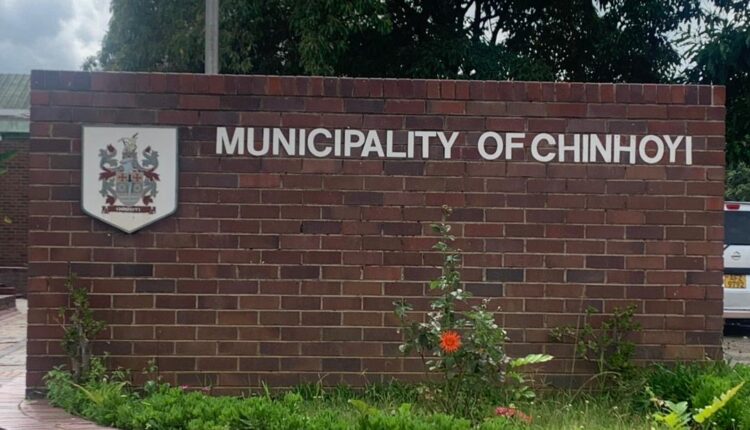
Chinhoyi – Chinhoyi Town Council is under scrutiny for alleged mismanagement of municipal properties, with investigations revealing that politically connected individuals and Zanu PF officials have been occupying municipal properties without paying rentals, resulting in significant loss of revenue for the financially struggling authority.
A visit to the council premises revealed informal foreign currency dealers operating openly, while residents were being forced to pay 50 cents to access private toilets leased from the council.
Councillors disclosed that the public toilets were being leased out to private operators due to the municipality’s failure to manage them.
Other properties under similar arrangements include houses, recreational facilities, and beer halls.
NewsHub launched an investigation into the leasing of council properties in the Mashonaland West capital, which has been struggling to gain city status for years.
This publication established that the council owns a significant property portfolio, including 26 houses in high-density areas, 3 in medium-density, 5 in low-density areas, 63 single quarters, 19 staff quarters, 124 one-roomed shops, and 8 beer halls in Gadzema, Chikonohono, Alaska, and Shackleton.
Most of these assets are either underutilised or occupied by individuals and organisations not paying rent, many of them with links to Zanu PF.
Without comprehensive lease agreements and a system to enforce payments, the council continues to lose potential revenue, exacerbating its inability to meet obligations such as paying its 400-member workforce, who have reportedly gone unpaid for 10 months.
Findings revealed that many of the named beneficiaries are linked to the ruling Zanu PF party and are allegedly occupying municipal properties without lease agreements or payment of rental fees.
At the Gwayagwaya bus terminus, a shop reportedly leased to Zanu PF for use as the Makonde district office has not generated income for the council for over four decades.
The property, expected to yield US$75 per month in rental income, has cost the council an estimated US$20,000 in unpaid dues since 1980.
Currently, the property is being used by a tenant identified as Tawanda Nzou, as a paid storage facility for traders and welders.
Nzou, in an interview, said he was just a caretaker, having been put there by the then Zanu PF provincial administrator, Christopher Chikomba.
“This is Zanu PF property and I’m the caretaker after being seconded by Mr Chikomba and Yotamu,” he said, in reference to John Yotamu, the former Mashonaland West provincial youth chairperson.
Nzou said he had no knowledge of the rental arrangements and referred queries to Chikomba.
Before independence, the building was a public library reserved for whites and funded by some local farmers.
According to Chikomba, Zanu PF took it over after the political changes that led to blackmajority rule in 1980.
In an interview, Chikomba further claimed the party had purchased the property between 2003 and 2008.
“We bought the building from council and the party signed a cheque to settle everything.
Go and check council minutes where a resolution was made to offer us the chance to buy the building,” he said, although he admitted he could not recall the amount paid or confirm if ownership was formally transferred.

The non-payment of rentals by Zanu PF generated heated debate in council chambers in November last year when Citizens Coalition for Change (CCC) Ward 8 councillor and chairperson of the audit committee, David Malunga, accused the ruling party of evading rentals and rates to the municipality.
“Council debtors include government ministries and political parties like Zanu PF. They must honor their obligations and pay up,“ said Malunga.
A Zanu PF councillor, Voster Mashevedzanwa, however insisted during a meeting that his party would not pay anything to council since it was in power.
“Don’t talk like that,” retorted Mashevedzanwa. We will not pay because we are the governing party and, remember, I will not allow you to trash my party like that,” added Mashevedzanwa.
The mayor, Owen Charuza, reportedly had to intervene to calm tensions and allow the meeting to proceed.
Council spokesperson, Tichaona Mlauzi, later claimed to NewsHub that the building in question was on government land.
“The former library (now Zanu PF provincial office) is situated on government property and, as such, is billed under state properties. Whether the state bills the occupant, we are not privy to such information,” said Mlauzi.
Similar cases were reported in other towns. In Kadoma, the mayor, Nigel Ruzario, confirmed that Zanu PF was not paying rentals for its offices opposite Rimuka Police Station.
“Those offices have council accounts but they are not paying rentals,” he said.
In Karoi, Zanu PF officials are reported to be occupying a former council residential property, but the local authority’s chairperson, Kudakwashe Chigumo, said, “I have to check if they are paying rentals but I doubt that very much.”
Further investigations revealed that individuals linked to Zanu PF, among them former Women’s League provincial chairperson, Chipo Chakweza—who could not be reached for a comment—are renting council shops without paying rentals and are subletting the premises to third parties.
Information gathered by this publication shows that council had no specific register for council-owned house.
It was also found that senior council officials, including those not entitled to council accommodation, are living in municipal houses while also receiving housing allowances.
“These houses are reserved for directors. However, when it is vacant, it is rented out to an employee who is billed. Those occupying council property are on rental basis and as such are billed every month while receiving their housing allowance,” said Mlauzi.
Malunga, when contacted for further clarification, declined to comment, stating that he was not authorised to speak on behalf of the council.

